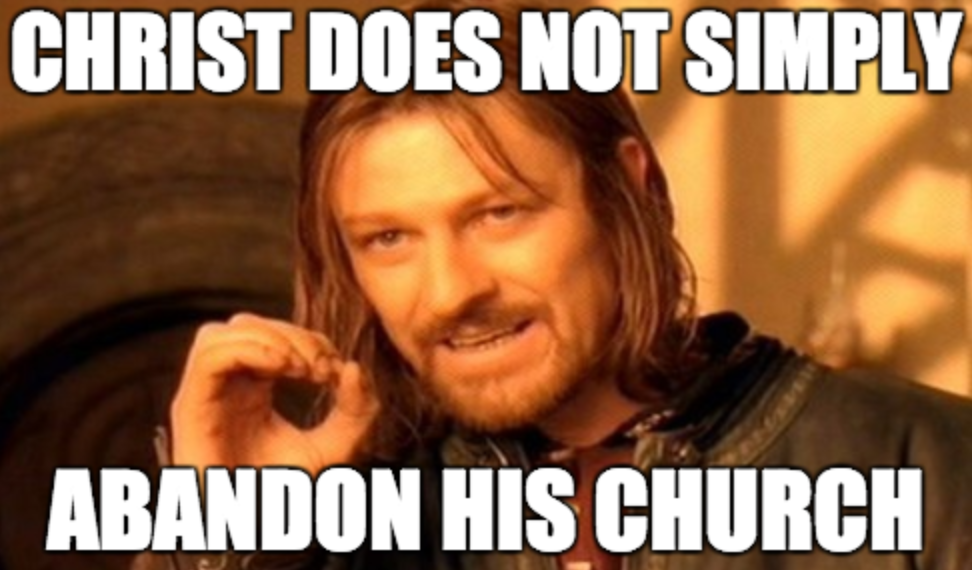Quick Apology: Losing Authority
Today’s “Quick Apology” comes from a conversation a friend of mine recently had with a Reformed Protestant. It’s actually a bit of a long response for a “Quick” apology, but oh well…
Objection
“I’ll concede that the case for the historical church being the Catholic church is very strong. However, the chosen people (the Israelites) were consistently disobeying God throughout history and eventually ended up crucifying Christ. Throughout history the chosen people abandoned God. What makes you think that the Catholic Church hasn’t done this or won’t do this?”
Response
Here, the Protestant is admitting to many of the claims of the Catholic Church, but appears to be challenging the Church’s continued status as Christ’s Church, as well as calling into question her continued authority.
It must first obviously be admitted that sinners are found in the Catholic Church. After all, why else do you think I’m allowed membership?!. However, a few points should be made…
Old Testament
Israel certainly sinned over the course of Salvation History. However, would it mean that because of this, it would be better for a Jew or Gentile to abandon God’s people and “go it alone”? Of course not! If one left Judaism, thinking that this couldn’t possibly be the true religion due to the hypocrisy of some of their rulers and many its followers, then one would be making a huge mistake!
As Saint Paul said, “…to them belong the sonship, the glory, the covenants, the giving of the law, the worship, and the promises; to them belong the patriarchs“ (Romans 9:4-5). The Lord had given to Israel many wonderful gifts for the sake of salvation. It would be crazy to reject these gifts and walk away!
However, we actually have an example in the Old Testament of when some members of Israel did just that. After King Solomon’s death, his son ascended to the throne (1 Kings 12) who was a complete tyrant. The northern tribes refused to follow him and this resulted in the division of the Kingdom: the Kingdom of Israel in the north and the Kingdom of Judea in the south. This separatist movement received the condemnation of the prophets. Not only had they abandoned their rightful king, they had cut themselves off from the priesthood, the Temple and the sacrifices.

New Testament
Let us also briefly consider some examples from later in Israel’s history. In the New Testament, how does Jesus speak about the religious authorities? As any good Bible Christian knows, Jesus called them “hypocrites” and “vipers” (Matthew 23:29-36). However, that was not all he said about them. Many people often overlook the verses a little earlier in that chapter:
Then said Jesus to the crowds and to his disciples, “The scribes and the Pharisees sit on Moses’ seat; so practice and observe whatever they tell you, but not what they do; for they preach, but do not practice. – Matthew 23:1-3
So, Jesus did indeed call the Pharisees “hypocrites”, but He also told His listeners to “practice and observe whatever they [say]”. Why on earth would He say that? The reason is because they had authority (“sit on Moses’ seat”).

The New and Greater Covenant
Finally, it is worth pointing out that, in the non-Catholic’s objection, a parallel is drawn from Old Testament. It is important to remember that the New Covenant is far more magnificent than the Old. It is infinitely greater and includes tremendous promises never made to Israel:
I will give you the keys of the kingdom of heaven, and whatever you bind on earth shall be bound in heaven, and whatever you loose on earth shall be loosed in heaven.” – Matthew 16:19
So unless one would be willing to say that Luther or one of the Reformers was some sort of New Christ, capable of wiping out the New Covenant and replacing it with a “Newer” Covenant for a “Newer” People of God, Christ’s promises still stand…as does His Church, founded on Rock, the “the pillar and bulwark of the truth” (1 Timothy 3:15).

Great post David!
Being a protestant myself, I occasionally wonder what the church would look like today had the Reformers simply remained in the Western church. Would the Western church have worked through its own problems and corrected the abuses that led the Reformers to split?
I think quite probably it would have.
This particular argument that your Reformed friend raised here is compelling. God’s people and the leaders of God’s people have historically made error’s of judgment and leadership. So I can see where one could point a finger at the Western and Eastern churches where they may have strayed.
I would argue that even though God’s appointed leadership of his people took wrong turns, God eventually brought them back to where they needed to be.
I think that the Reformers may have jumped ship to soon, in effect starting their own Northern Kingdom, and ensuring that the Western church would never again be one church.
> Great post David!
Thanks
> Being a protestant myself, I occasionally wonder what the church would look like today had the Reformers simply remained in the Western church. Would the Western church have worked through its own problems and corrected the abuses that led the Reformers to split?
Well, I guess it depends on (a) who you count as a Reformer and (b) at what stage of that Reformer’s life.
For example, all of Luther’s original issues with the Church have been cleared up. I think you could actually probably argue that Luther’s initial objections were all dealt with by the time of the Council of Trent.
However, as time progressed, Luther got bolder and bolder in his dissent and objected to more and more Catholic teaching, putting forward his new doctrine of Sola Fide.
(Even on this point though, I think it would be possible to say that Luther’s issue in this area has largely been solved, at least in terms of initial justification, as seen by the recent Catholic-Lutheran joint statement)
> I would argue that even though God’s appointed leadership of his people took wrong turns, God eventually brought them back to where they needed to be
Yes, and just because there were bad kings and bad priests, God didn’t just do away with the throne or the Temple (…at least until the time when they could be replaced with the good things of the New Covenant).
> I think that the Reformers may have jumped ship to soon, in effect starting their own Northern Kingdom, and ensuring that the Western church would never again be one church.
I think there are a lot of parallels between the splitting of the Kingdom of David and the Reformation. The reasons were similar, but the schism was still wrong. I was tempted to draw out these parallels in this post, but this is meant to be a “Quick” apology. That’ll be one for the future
Pingback: This Week’s Best in Catholic Apologetics | DavidLGray.INFO